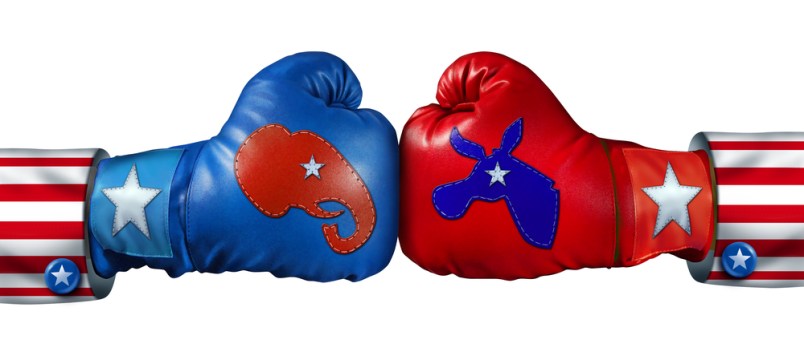WASHINGTON (AP) — The major campaign committees collected almost a half-billion dollars in 2013 — a year when just two states chose governors, two had special Senate elections and six House districts had unplanned races — and spent most of it.
That eye-popping sum doesn’t capture the millions raised and spent by the candidates themselves or the outside groups and advocacy organizations that plan to play a major role in 2014’s federal elections, which could tilt the balance of power in the Senate and perhaps the House, and races for governor in 36 states. Friday’s reports to the Federal Election Commission hint that November’s elections will be awash with cash.
The two political parties’ federal campaign committees raised $371 million for federal races and spent just shy of $300 million. Add in the governors, and the total haul grows to almost $450 million.
Friday’s top-line numbers put Democrats slightly ahead of Republicans, but not by a margin that would decide the fate of candidates in 2014. Taken with the Democratic National Committee’s almost $16 million debt and the Democratic Senatorial Campaign Committee’s $3.75 million in red ink, they are roughly even.
The DNC started 2013 with $20 million in debt. The DSCC started its year with $15.7 million in debt.
Heading into this year, the reports suggest heavy spending will be the norm. The Republican National Committee alone spent $76 million last year, largely on rebuilding its campaign technology and hiring operatives to work alongside state parties.
“The reason we did pretty well raising money in 2013 is that we were selling a plan to the people that were going to invest in the RNC,” party chairman Reince Priebus has said.
The Republican National Committee said it raised almost $81 million last year and has $9 million in hand to keep working on a technology gap that, in part, cost it the last two presidential races. The RNC said it’s debt-free.
The RNC outraised the Democratic National Committee, which took in — and spent — about $65 million. The DNC ended the year carrying $15.6 million in debt.
The Democrats’ committee to elect members to the House raised almost $76 million last year to fund its effort to retake the majority. The Democratic Congressional Campaign Committee reported it has $29.3 million in the bank.
The National Republican Congressional Committee trailed, raising almost $61 million and banking $21 million for this year’s elections.
The GOP enjoys a 32-seat advantage in the House, 232 Republicans to 200 Democrats. There are three open seats.
On the Senate side of Capitol Hill, Democrats’ campaign committee raised $52.6 million to defend their majority. The Democratic Senatorial Campaign Committee also reported it had banked $12 million, but it had $3.75 million in debt heading into the election year.
The National Republican Senatorial Committee raised $36.6 million last year and had $8 million banked. It had no debt, meaning it had roughly the same amount of cash to send to its candidates as its Democratic rival.
Thirty-five Senate seats are up this year, and Democrats will be defending 21 of them. The balance of power in the Senate is 45 Republicans, 53 Democrats and two independents who generally vote with the Democrats. Republicans need a net gain of six seats to wrest the Senate from Democrats’ control.
The Republican Governors Association said it raised $50.3 million last year and has roughly the same amount in the bank. Its rival, the Democratic Governors Association, said it raised $28 million last year but did not release its bank balance.
There are 36 gubernatorial races in 2014. Of those, Republicans control the governor’s office in 22 states.
While the reports offer a glimpse at the number of television ads, phone calls, mail pieces and knocks on the door voters can expect, it doesn’t fully capture political activity heading toward November.
Some of the biggest spenders were not included in Friday’s reports because, technically, they are not considered campaign operations. That means it will be months before a true assessment of political spending is possible.
One example is Americans for Prosperity, a conservative group backed by billionaire brothers Charles and David Koch. The group already has spent around $6 million to criticize Sen. Kay Hagan of North Carolina and $1.7 million attacking Sen. Mary Landrieu of Louisiana. The two are among the most vulnerable Senate Democrats.
All told, the Koch-backed organization has spent more on television ads this year in seven states with competitive Senate races than all the outside Democratic groups combined have spent on Senate races in 10 hard-fought states. The group also has started a national advertising campaign on Fox News Channel and CNN.
To counter the Americans for Prosperity ads, former aides to Senate Majority Leader Harry Reid, D-Nev., have begun airing ads defending incumbent Democrats. The effort, Senate Majority PAC, filed its report with the FEC showing it raised $8.6 million last year and has $3.2 million banked to keep Reid running the Senate.
Its largest donor: Michael Bloomberg. The former New York mayor, a political independent, wrote the group a $2.5 million check.
Copyright 2014 The Associated Press. All rights reserved. This material may not be published, broadcast, rewritten or redistributed.






